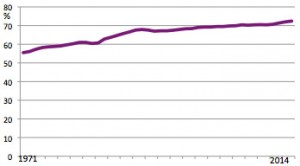Who knows whether a better understanding of the issues changes how people vote – it seems unlikely. Understanding is still important, though: the more voters can tell when politicians are spouting nonsense, the less incentive there will be at the margin for the latter to announce stupid policies in the heat of an election campaign.
OK, perhaps I’m being delusional. But I’m working up to commending a new book (which I’m part way through) by Vicky Pryce, Andy Ross and Peter Urwin, [amazon_link id=”1849547459″ target=”_blank” ]It’s The Economy, Stupid: Economics for Voters[/amazon_link]. Between them the three authors have unmatched experience of working inside the sausage machine of government policy, as senior economists at BIS (Pryce), the Treasury (Ross), and working with departments such as HMRC and DWP (Urwin). The book covers the macro issues (austerity, productivity and growth, Europe) and micro/social policy issues (health, environment, discrimination, immigration).
[amazon_image id=”1849547459″ link=”true” target=”_blank” size=”medium” ]It’s the Economy, Stupid: Economics for Voters[/amazon_image]
Writing a book of this kind is tricky when partisan feelings and emotions are running high. It strikes on the whole a successful balance between being neutral and setting out the evidence/logic on the various topics. After all, the truth is not always non-partisan. There are also issues on which reasonable economists disagree, such as the strength/weakness of the case for HS2, or the extent and timescale for the necessary reductions in CO2 emissions if we are to avoid catastrophic climate events. The first chapter makes a strong case for the importance of economic assessments of policies and for the role of economists in government, and yet I think it could have been a bit more reflective about the way economics has come to dominate policy choices. (Maybe that comes further on than I’ve read so far.)
With this caveat, any UK voter trying to make sense of the economic claims and counter-claims – there will be a lot of that with this week’s budget – would be well rewarded by reading this book. It will also last as a useful read on the issues for students of economics from AS level onward, as it’s very clearly written – just as you would expect from such experienced writers of policy briefs – and includes lots of references for further reading. Inevitably, it doesn’t cover all possible subjects, but it’s a shame that those most relevant to young people – housing, student finance, and the full implications of demography and the pension bill for public spending on younger people – are missing.
There are some other terrific economic resources for voters too. Two that stand out are the IFS Election 2015 briefings and the CEP’s Election 2015. NIESR has looked at the macro implications of the parties’ fiscalplans. The Manchester Policy blog covers a wider range of issues, not just economics, and Manchester this week launched a free Election MOOC (aimed at 6th formers but suitable for all). How marvellous it would be if we all got ready to meet our candidates during the next few weeks by lining up our questions and factual ammo from the book and these excellent resources.


